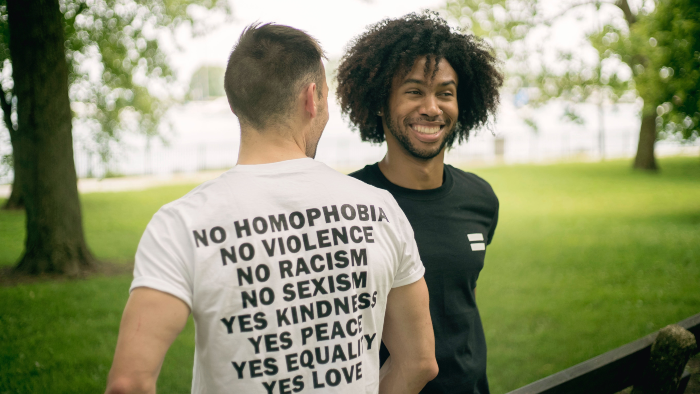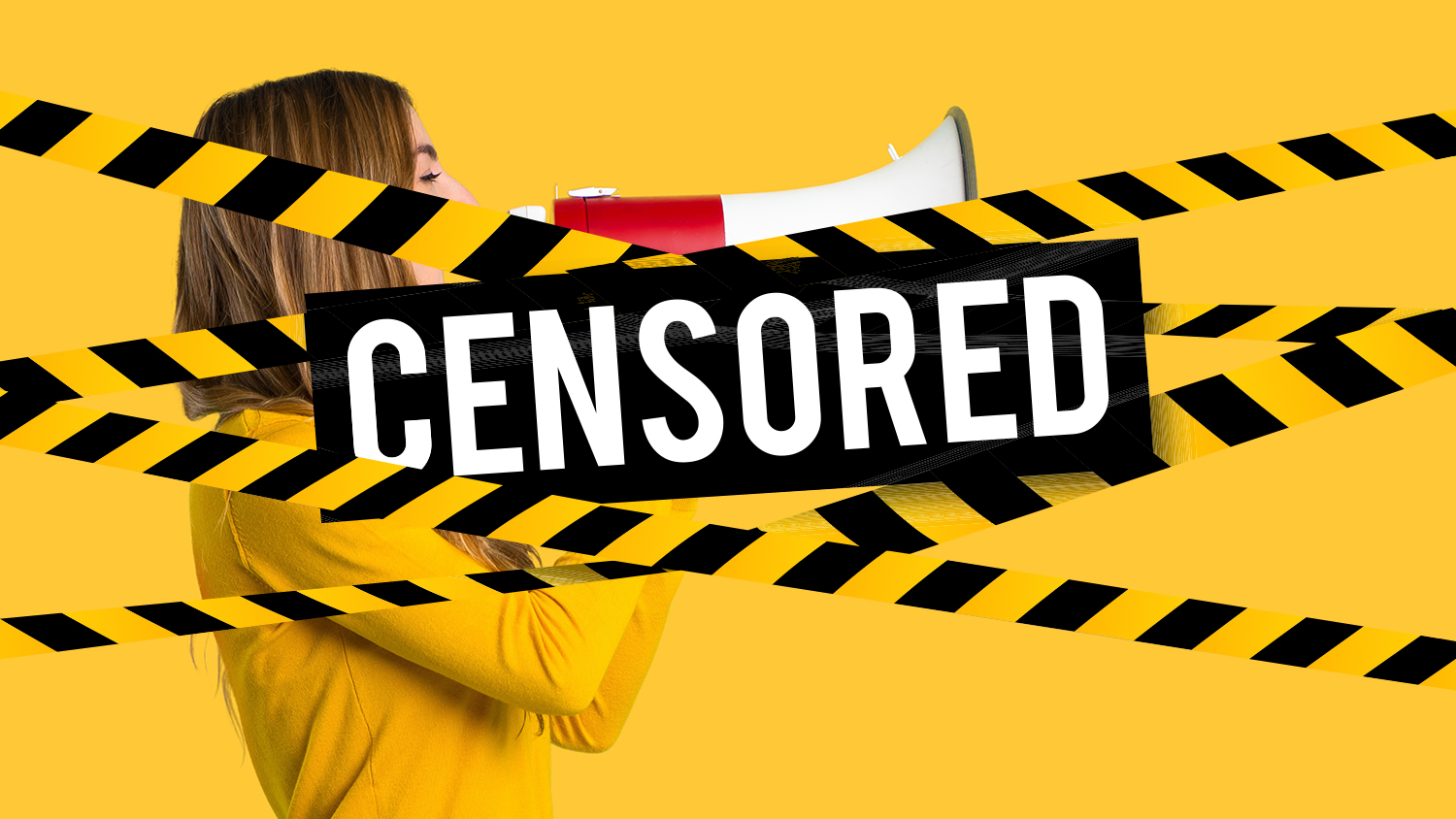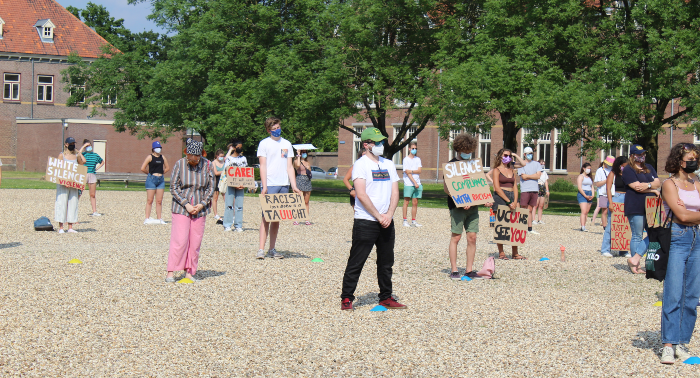Woke: 'Real dialogue, nobody learns that' (Part 2)
In case you’ve been living under a rock, “cancelling” is a form of ostracism in which people who express discriminatory views or commit acts of discrimination are kept from having a platform or a career. This is mostly an online affair targeting celebrities, politicians, influencers and other people in the public eye. Think of massive unfollow campaigns or petitions asking advertisers to cut ties with someone they work with. Whether this strategy works is up for debate: British writer J.K. Rowling, of Harry Potter fame, was cancelled because of statements considered transphobic, but her book sales went through the roof in the UK following the controversy.
Celebrities aren’t the only ones that can be cancelled, however: social media users with a rather modest following are also cancelling each other. That’s why some say we now live in a “cancel culture” which renders many people afraid of expressing their true opinions. They would rather stay quiet than make a mistake that would cause them to be attacked on the Internet.
Calling in or calling out?
What happens when cancelling reaches the university? To UU Rector Henk Kummeling, a boycotting attitude is simply incompatible with an academic environment. “You don’t help people by shutting them off. Some think we should cut all ties with Israeli universities, for example. But couldn’t this cooperation, while in the meantime staying in close contact with Palestinian academics, contribute to stirring the debate in the right direction, also in Israel?” The rector mentions that UU kept its ties with South African universities during the apartheid era, which he claims was helpful in the transition period. “I’m not saying the situation in Israel is the same but, as academics, we should think of the consequences of what we are doing. A simple boycott, in many cases, is not that effective”.
Some left-wing activists have been discussing the value and the limits of cancel culture. How effective is it and what consequences can it have? Some suggest calling people in before calling them out. Candice Etemesi, a UCU graduate associated with Work in Progress and the African Caribbean Heritage Network, thinks boycotting is sometimes necessary. “Yes, some innocent people and issues get caught up in the crossfire, but I’d rather establish a nuanced conversation through boycotting than not having the conversation at all”.
Assistant Professor of Philosophy Floris van den Berg thinks otherwise: “You can disagree with the other side, but you shouldn’t de-platform them. We should keep the university intellectually open by learning from our opponents and giving them the floor.”
Chiara Robbiano, Associate Professor in Cross-Cultural Philosophy at UCU, notes that “if students are angry, it might come from believing that dialogue with those in power is impossible – and that is our responsibility”. She postulates that academics should be curious rather than defensive: why is this happening?
She also draws attention to an overlooked factor: as a general rule, students were never taught how to have a dialogue. "I never learned it as a student", she says. "I was allowed to ask questions but they were more clarificatory questions, especially in Italy, where I come from. Dutch colleagues might be used to debates, but real dialogue, in which people are open to learning from each other and switching their framework to accommodate another one, nobody learns that. But we must try. And it will go wrong the first time around because we’re not trained. So we have to keep trying”.
 Some activists recommend "calling people in" before "calling them out". Photo: Pexels
Some activists recommend "calling people in" before "calling them out". Photo: Pexels
Ella, Master's student of Cultural Anthropology and member of student activist group Work in Progress, doubts that the majority of people are cancellers. “I’ve heard students saying they’re afraid to ask questions out of ignorance. Especially Dutch students, who come from a school system in which they are taught about the golden age of the Netherlands, for instance, and then they come to UCU where there are a bunch of international students to whom that was definitely not a golden age. So, they’re afraid that, if they ask a question they’re going to be yelled at or cancelled. I understand it’s a toxic thing to study with this fear, but I really think that, if somebody asks a question in good faith, people won’t yell”.
Robbiano agrees: “Most people are really forgiving. I once asked students to draw something to show how they had understood the class. Someone drew two stick figures and I said ‘this guy…’ but then the student replied: ‘hey, this isn’t gendered’. And everybody was laughing. They know everyone makes mistakes all the time. Why do I think of a man when I see a ball with two eyes and a mouth? If there is not too much rigidity on my side and I allow myself to be vulnerable, then things don’t escalate. Our cherished values need not be cancelled or replaced, but examined and adapted to the changing time.”
In her opinion, the person who is afraid of cancel culture is usually “someone who was comfortable and relaxed in their own bubble, which they believed was very cosmopolitan, when actually it was really just one kind of people or one kind of people with regards to something they value very much, such as secularity”.
What makes a classroom safe?
Another idea typically associated with “woke” is that the university should ensure that the classroom is a safe space for disenfranchised groups. This means not only that verbal and physical assaults should be forbidden, but that all students, especially those with a minority background, should feel comfortable, welcome and equal. That requires being on the lookout for topics and expressions that might distress them or trigger some kind of trauma.
Van den Berg takes issue with this idea. “It’s important for students, especially in Philosophy, to grasp the whole spectrum of ideas and ideologies. But this might indeed cause distress to some students.”
Henk Kummeling is critical about it as well. “We have a code of conduct and there are all kinds of legislation, also in criminal law”, he declares. “The university explicitly prohibits discriminatory behaviour. But that’s something different than establishing a kind of censorship beforehand, in which people are not allowed to speak of certain things”.
 UU's rector finds that the university shouldn't combat discriminatory behaviour by establishing "a kind of censorship beforehand". Photo: Shutterstock, DUB.
UU's rector finds that the university shouldn't combat discriminatory behaviour by establishing "a kind of censorship beforehand". Photo: Shutterstock, DUB.
The rector adds: “In my view, the university should be safe to have that debate. Safe in that you are protected in voicing your opinion. It should also be safe in the sense that the person who is offended by the texts or expressions used by the teacher feels safe to say so and start a discussion about that. And that the teacher doesn’t dismiss it by saying ‘that’s not relevant. I’m the person in charge here’”.
But, by relying on existing laws and codes of conduct alone, isn't the university refraining from assuming an active role regarding the conflicts that are bound to occur as a result of more diversity? That's what Work in Progress member Ella believes. "The university is a very white, heteronormative, cisgender space. Just saying to everyone that they’re welcome and should feel at home here is not working. Because once you have this diversity there, there’s going to be conflict. You’re not making space for other people, you’re just allowing them to enter an established space".
Ella reckons that some academics criticise the “woke” idea of safe space because academia in its current form is their safe space. “This is just their safe space that has been infiltrated by others. And it bothers them that there are people challenging their ideas in a place where they used to be very safe and most people shared their values”.
The Master’s student adds: “The role of the teacher, as a moderator, is to make sure that everybody is calm and engages respectfully, in good faith with each other. I’ve heard teachers at staff meetings saying ‘these students are ferocious, I just back off and let them go at it’. I think that’s irresponsible”.
Work in Progress colleague Candice, to whom the classroom, adds: “I get that a university is a place where you have intense debates about complex issues, but that doesn’t mean you have to be inflammatory”. She also highlights the importance of not always taking things personally. “As an international student and a black woman, I come from a different perspective from the typical white, Dutch student. People have said things in class that have offended me countless times. And I went to an international college! But I’ve also come to learn that it’s not always personal.”
To Philosophy teacher Robbiano, a classroom must be a safe space where people listen to each other with the goal to learn from the texts and one another, which is different from merely tolerating different views. “Listening means to learn to value different takes on the topic, different frameworks and experiences that will enrich our understanding. The space is safe when the students know that their attempt to relate to the topic is valuable for everyone in class”.
 Trigger warnings serve to alert students of potentially distressing material. Photo: Pexels
Trigger warnings serve to alert students of potentially distressing material. Photo: Pexels
Trigger warnings: is there room for emotion in a classroom?
Some argue that one of the ways in which the university can ensure a safe space is by making use of trigger warnings ahead of sensitive, anxiety-inducing or potentially traumatic topics. Among them, there are people who defend that certain triggering topics shouldn’t even be present in the classroom in the first place.
Floris van den Berg: “I teach Ethics, so we discuss a lot of horrible examples – unfortunately, the world is horrible sometimes – like rape or the hanging of homosexuals, and people can feel triggered. I understand that but I’m not going to stop discussing these topics. People nowadays get emotional so fast. It’s hard to even start a discussion that way. I think that students should learn how to cope with topics which they find emotionally disturbing. I provide only one trigger warning at the beginning of the course”.
To Robbiano, normalising emotion in the classroom is essential. Trigger warnings are, therefore, not an issue. “If a topic makes students emotional, we should give room to that. We’re humans, not numbers or robots. When I was a student, a guest lecturer once told us to watch a certain movie and I remember I felt physically unwell when watching it. And that’s okay. If students cannot do it at a certain point in their life, then they shouldn’t be forced. But the door should be open for them to articulate their emotions should they feel ready for it.”
As an example, she mentions someone who fled from war. “Maybe this person can’t follow a certain class. But if they feel okay with sharing something about their experience with the rest of us, then they’re bringing our learning community to another level”. In her opinion, the most important thing is to acknowledge “the value of what diversity can bring”.
Changing the canon: is what we are teaching relevant?
Calls for a more diverse university community and curriculum (with authors that represent different genders, ethnicities, sexualities, origins etc.) are often deemed “woke”. Especially by those who are not totally on board with the idea.
“I teach Philosophy, so the syllabus is filled mostly with white males”, says Floris van den Berg, who is not willing to change the curriculum only for the sake of including authors from different backgrounds. “I select literature which I deem relevant and which is suitable for the course. I do not look at what the author’s background is”. Doing so would “take the scientific and academic paradigm away from its core values”, he finds. Van den Berg also underscores that academic education is not only about studying the mandatory reading, but rather using it as a basis to keep exploring the field yourself.
Work in Progress member Candice defends the students calling for a more inclusive canon: “It’s not that we’re intolerant towards the standard narratives, we just want all narratives. Many senior academics have spent their entire careers researching and producing a certain kind of work, and they won accolades for that. To ask them to now change some of these ideas… I understand it’s a lot! But that doesn’t mean it doesn’t need to change”.
As a teacher of Cross-cultural Philosophy, Chiara Robbiano’s work aims precisely to show that Philosophy is not only a white, male and Western affair. In her view, today's students don’t always have a clear picture of what they would like to learn. They are just not sure whether what they’re being taught is relevant to them. In a world where things become irrelevant ever more quickly, that is only understandable. “So, let’s discuss that. Since the university is a place to reflect, teachers should be reflecting on the importance of what they’re teaching”.
In her experience, if the teacher can show students why reading a certain author is important for their personal and intellectual growth, the students tend to accept their presence in the syllabus, even if the author in question owned slaves or had questionable behaviour.
To rector Kummeling, diversifying the curriculum should be one of UU’s top priorities. He mentions the work of associate Professor Jeroen Janssen, who has developed a toolkit to assess whether a curriculum is inclusive. Kummeling would like this toolkit to be adopted “on each and every level” from September on. “Let’s see if it works, if it’s helpful in the discussion and to evaluate whether there is room for more inclusivity at UU”.

UCU students protest against structural racism at UU. Photo: DUB
Why is dialogue so hard?
One thing that stands out in all the conversations DUB had about “woke” is that both sides say they want more dialogue and openness to different points of view. Then why is it so hard to do just that? There are certainly many factors explaining it, but our interviewees are unanimous in saying that social media is partly to blame. After all, this is the first generation of university students who were raised with social networks.
“I think this age has become more and more oriented by identity. L’ère de l’individu tyran, as Eric Sadin names it. Becoming more aware of one’s identity is a key element, but it’s also about awareness that a lot of things must change”, says Kummeling. “We are not used to having a nuanced debate anymore because we’ve gotten used to voicing our opinions on social media, where extremist views get more attention. The people who want to bring nuance to the discussion are not always applauded by the environment: ‘did you run over the to the enemy? What are you doing?’”
Floris van den Berg: “It seems to me that woke people don’t want to be confronted with ideas they dislike, so they ask ‘please give me something that I like’, just like their social media feeds do. And I don’t think that’s good for your intellectual development”.
“Not only do we stay in our echo chambers on social media, but we think that we are super cosmopolitan and open-minded because our echo chamber has people from all over the world. But actually, all those people look alike. For example, if we’re not religious, all our friends are not religious, so it’s okay to say certain things in certain ways”, notes Chiara Robbiano.
The rector adds that the pandemic hasn’t helped things, either. “We were not able to look at each other in the eye. If we sit together in the same room, there is no escape anymore, we have to discuss things, you can’t just switch off”.
Last but not least, there’s the fact that change is hard for everyone. In Kummeling’s opinion, people have a hard time accepting change because “it implies doing things differently, giving up positions, relating to other people than before. Research shows that change is a very difficult concept”.
“How do you work with someone with completely different assumptions? Both need to know that both will make mistakes and hurt the other one a little bit, but it will be good pain. Pain that makes you grow”, concludes Robbiano.